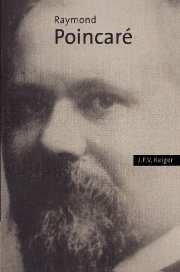Raymond Poincaré (August 20, 1860 – October 15, 1934) was a French conservative statesman who served as Prime Minister of France on five separate occasions and as President of France from 1913 to 1920.
Born in Bar-le-Duc, Meuse, France, the son of Nicolas Antonin Hélène Poincaré, a distinguished civil servant and meteorologist. Educated at the University of Paris, Raymond was called to the Paris bar, and was for some time law editor of the Voltaire.
As a lawyer, he successfully defended Jules Verne in a libel suit presented against the famous author by the chemist Eugène Turpin, inventor of the explosive Melinite, who claimed that the "mad scientist" character in Verne's book "Facing the Flag" was based on himself. (A letter which Verne later sent to his brother Paul seems to suggest that, though acquitted due to Poincaré's spirited defence, Verne did intend to defame Turpin.)
Poincaré had served for over a year in the Department of Agriculture when in 1887 he was elected deputy for the Meuse. He made a great reputation in the Chamber as an economist, and sat on the budget commissions of 1890–1891 and 1892. He was minister of education, fine arts and religion in the first cabinet (April – November 1893) of Charles Dupuy, and minister of finance in the second and third (May 1894 – January 1895).
In Alexandre Ribot's cabinet Poincaré became minister of public instruction. Although he was excluded from the Radical cabinet which followed, the revised scheme of death duties proposed by the new ministry was based upon his proposals of the previous year. He became vice-president of the chamber in the autumn of 1895, and in spite of the bitter hostility of the Radicals retained his position in 1896 and 1897.
Along with other followers of "Opportunist" Léon Gambetta, Poincaré founded the Democratic Republican Alliance (ARD) in 1902, which became the most important center-right party under the Third Republic. In 1906 he returned to the ministry of finance in the short-lived Sarrien ministry. Poincaré had retained his practice at the bar during his political career, and he published several volumes of essays on literary and political subjects.
World War I
Changes
Raymond Poincaré - President of the Council and Minister of Foreign Affairs
Alexandre Millerand - Minister of War
Théodore Steeg - Minister of the Interior
Louis Lucien Klotz - Minister of Finance
Léon Bourgeois - Minister of Labour and Social Security Provisions
Aristide Briand - Minister of Justice
Théophile Delcassé - Minister of Marine
Gabriel Guist'hau - Minister of Public Instruction and Fine Arts
Jules Pams - Minister of Agriculture
Albert Lebrun - Minister of Colonies
Jean Dupuy - Minister of Public Works, Posts, and Telegraphs
Fernand David - Minister of Commerce and Industry
12 January 1913 - Albert Lebrun succeeds Millerand as Minister of War. René Besnard succeeds Lebrun as Minister of Colonies. Poincaré's First Ministry, 21 January 1912 – 21 January 1913
Changes
Raymond Poincaré - President of the Council and Minister of Foreign Affairs
André Maginot - Minister of War
Maurice Maunoury - Minister of the Interior
Charles de Lasteyrie - Minister of Finance
Albert Peyronnet - Minister of Labour
Louis Barthou - Minister of Justice
Flaminius Raiberti - Minister of Marine
Léon Bérard - Minister of Public Instruction and Fine Arts
Henry Chéron - Minister of Agriculture
Albert Sarraut - Minister of Colonies
Yves Le Trocquer - Minister of Public Works
Paul Strauss - Minister of Hygiene, Welfare Work, and Social Security Provisions
Lucien Dior - Minister of Commerce and Industry
Charles Reibel - Minister of Liberated Regions
5 October 1922 - Maurice Colrat succeeds Barthou as Minister of Justice. Poincaré's Fourth Ministry, 23 July 1926 – 11 November 1928
Second Republic: Jacques-Charles Dupont de l'Eure | Louis-Eugène Cavaignac | Louis Napoleon Bonaparte Interregnum: Louis Jules Trochu | Blum
 Fourth Republic: Ramadier | Schuman | Marie | Schuman | Queuille | Bidault | Queuille | Pleven | Queuille | Pleven | Faure | Pinay | Mayer | Laniel | Mendès-France | Faure | Mollet | Bourgès-Maunoury | Gaillard | Pflimlin | de Gaulle Fifth Republic: Debré | Pompidou | Couve de Murville | Chaban-Delmas | Messmer | Chirac | Barre | Mauroy | Fabius | Chirac | Rocard | Cresson | Bérégovoy | Balladur | Juppé | Jospin | Raffarin | de Villepin | Fillon
Fourth Republic: Ramadier | Schuman | Marie | Schuman | Queuille | Bidault | Queuille | Pleven | Queuille | Pleven | Faure | Pinay | Mayer | Laniel | Mendès-France | Faure | Mollet | Bourgès-Maunoury | Gaillard | Pflimlin | de Gaulle Fifth Republic: Debré | Pompidou | Couve de Murville | Chaban-Delmas | Messmer | Chirac | Barre | Mauroy | Fabius | Chirac | Rocard | Cresson | Bérégovoy | Balladur | Juppé | Jospin | Raffarin | de Villepin | FillonRaymond Poincaré - President of the Council
Aristide Briand - Minister of Foreign Affairs
Paul Painlevé - Minister of War
André Tardieu - Minister of the Interior
Henry Chéron - Minister of Finance
Louis Loucheur - Minister of Labour, Hygiene, Welfare Work, and Social Security Provisions
Louis Barthou - Minister of Justice
Georges Leygues - Minister of Marine
Laurent Eynac - Minister of Air
Pierre Marraud - Minister of Public Instruction and Fine Arts
Louis Antériou - Minister of Pensions
Jean Hennessy - Minister of Agriculture
André Maginot - Minister of Colonies
Pierre Forgeot - Minister of Public Works
Georges Bonnefous - Minister of Commerce and Industry
No comments:
Post a Comment